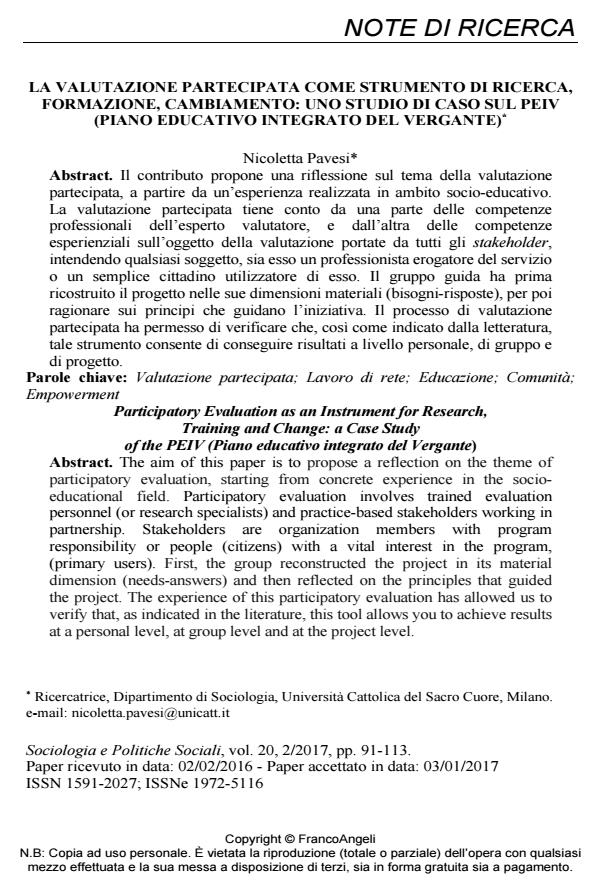La valutazione partecipata come strumento di ricerca, formazione, cambiamento: uno studio di caso sul Peiv (piano educativo integrato del vergante)
Titolo Rivista SOCIOLOGIA E POLITICHE SOCIALI
Autori/Curatori Nicoletta Pavesi
Anno di pubblicazione 2017 Fascicolo 2017/2
Lingua Italiano Numero pagine 23 P. 91-113 Dimensione file 339 KB
DOI 10.3280/SP2017-002006
Il DOI è il codice a barre della proprietà intellettuale: per saperne di più
clicca qui
Qui sotto puoi vedere in anteprima la prima pagina di questo articolo.
Se questo articolo ti interessa, lo puoi acquistare (e scaricare in formato pdf) seguendo le facili indicazioni per acquistare il download credit. Acquista Download Credits per scaricare questo Articolo in formato PDF

FrancoAngeli è membro della Publishers International Linking Association, Inc (PILA)associazione indipendente e non profit per facilitare (attraverso i servizi tecnologici implementati da CrossRef.org) l’accesso degli studiosi ai contenuti digitali nelle pubblicazioni professionali e scientifiche
Il contributo propone una riflessione sul tema della valutazione partecipata, a partire da un’esperienza realizzata in ambito socio-educativo. La valutazione partecipata tiene conto da una parte delle competenze professionali dell’esperto valutatore, e dall’altra delle competenze esperienziali sull’oggetto della valutazione portate da tutti gli stakeholder, intendendo qualsiasi soggetto, sia esso un professionista erogatore del servizio o un semplice cittadino utilizzatore di esso. Il gruppo guida ha prima ricostruito il progetto nelle sue dimensioni materiali (bisogni-risposte), per poi ragionare sui principi che guidano l’iniziativa. Il processo di valutazione partecipata ha permesso di verificare che, così come indicato dalla letteratura, tale strumento consente di conseguire risultati a livello personale, di gruppo e di progetto.
Parole chiave:Valutazione partecipata; Lavoro di rete; Educazione; Comunità; Empowerment
Nicoletta Pavesi, La valutazione partecipata come strumento di ricerca, formazione, cambiamento: uno studio di caso sul Peiv (piano educativo integrato del vergante) in "SOCIOLOGIA E POLITICHE SOCIALI" 2/2017, pp 91-113, DOI: 10.3280/SP2017-002006